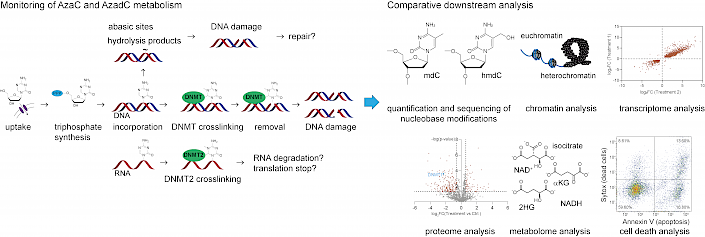 Group of Dr. Traube - Faculty for Chemistry and Pharmacy
Group of Dr. Traube - Faculty for Chemistry and Pharmacy
 Group of Dr. Traube - Faculty for Chemistry and Pharmacy
Group of Dr. Traube - Faculty for Chemistry and Pharmacy
Epigenetic drugs like 5-azacytidine (AzaC) and 5-aza-2'-deoxy-cytidine (AzadC), which covalently trap DNMT enzymes, aim to revert the cancer epigenome and thereby induce either apoptosis or reprogramming of cancer cells. In comparison to other cytostatic anti-cancer drugs, 5-aza-cytosine-based compounds have the unique effective profile of intervening on the genomic and epigenomic level at the same time by inducing DNA-damage and DNA hypomethylation. Although their principle mechanism of action is known, it remains elusive which cancer cells are sensitive towards AzaC or AzadC treatment and if they are to which extent. To improve the use of 5-aza-cytosine based drugs in the clinic, our aim is to monitor every step of the compounds' metabolism from uptake to removal and the affected cellular pathways in simple 2D cultures of cancer cells and more complex tumor-derived organoids.

Constantly proliferating cancer cells are proned to incorporate high amounts of nucleoside-based cytostatic drugs into their genome, which often leads to fast accumulation of severe DNA damage and cell death. Cancer stem cells in contrast are often in a quiescent state and are therefore not accessible to many cell cycle-dependent cytostatic drugs. As a consequence, patients that seem to be initially free of cancer cells after treatment, experience relapse which is often characterized by increased aggressivity. AzaC can be not only incorporated into DNA, but the vast majority is incorporated into RNA, which does not depend on S-phase. Our aim is to better understand what the RNA-specific effect of AzaC is and how this feature can be used to target cancer stem cells.
Topic-related publications
Traube FR#, Brás NF, Roos WP, Sommermann CC, Diehl T, Mayer RJ, Ofial AR, Müller M, Zipse H, Carell T# “Epigenetic anti-cancer treatment with a stabilized carbocyclic Decitabine analogue“ Chem. Eur. J. (2022), e202200640.
Wildenhof TM, Schiffers S, Traube FR, Mayer P, Carell T#. “Influencing Epigenetic Information with a Hydrolytically Stable Carbocyclic 5-Aza-2’-deoxycytidine” Angew. Chem. Int. Ed. Engl. 58 (2019), 12984 – 12987.
This project is funded by the Daimler and Benz Foundation
